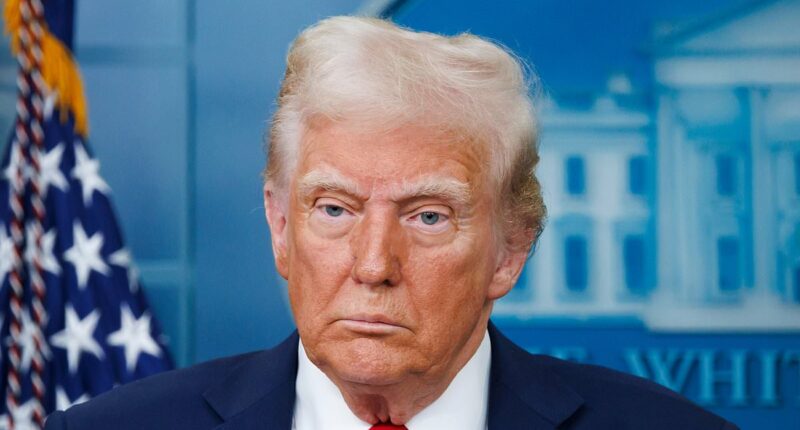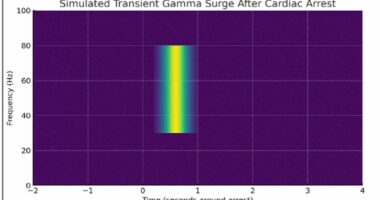Share this @internewscast.com
In an unexpected twist following Donald Trump’s State Visit, AstraZeneca and GSK, two of Britain’s forefront pharmaceutical companies, have announced they will invest £59 billion in the US over the next five years, leaving UK spending on pause.
The switch of focus reflects the fragmentation of global trade provoked by Russia’s war on Ukraine and Trump’s tariff mayhem.
Big pharma is doubling down on its biggest markets. GSK earns more than 50 per cent of its income in the US.
Astra views the US and China as the best opportunities and Britain, where it earns less than 2 per cent of revenues, as less important.
This despite the funds it pours into research labs in Britain’s universities such as Cambridge, Oxford and York.
Anger with Health Secretary Wes Streeting and the Government is palpable. A published pharma strategy is no more than hot air.

Bizarre outcome: Donald Trump’s visit to Britain has seen AstraZeneca and GSK pledging £59billion of investment in the US over the next five years
With Trump’s departure, pharmaceutical producers are eager to restart discussions about the NHS drug rebate, as per the agreement on pricing and access for branded medicines.
Originally, funds raised were to be recycled into innovation – but most of the income vanishes into the NHS void.
The 27 per cent rebate demanded by Streeting, up from 15 per cent, is regarded as unacceptable.
There’s considerable dissatisfaction towards the National Institute for Health and Care Excellence (Nice), tasked with ensuring taxpayer value. Astra’s breast cancer treatment is accessible in Scotland but not in England.
The same goes for prostate cancer cure Zytiga, discovered in London and now in the Johnson & Johnson locker.
Recently, Astra declared their lupus medication, aimed at the immune system, is set for release. Yet, it remains uncertain if British patients will be accommodated.
Even if there is a compromise on rebates, terrible damage has been done. Labour’s life sciences agenda is disappearing.
Doom loop
Life doesn’t get any easier for Chancellor Rachel Reeves. The latest monthly borrowing figures are a shocker.
Five months into the financial year and borrowing totalled £83.8billion, which is £11.4billion above forecast.
All the £40billion of tax rises imposed last year has done is fuel inflation, raise borrowing costs and tip Britain deeper into debt.
The situation could deteriorate further before the Budget on November 26, especially if the Office for Budget Responsibility (OBR) decides to reduce its productivity and growth predictions.
The markets are less than pleased.
After a good run, the pound dipped against the dollar and bond yields, already in the danger zone, ticked up.
There is no sterling crisis yet, but if the pound slippage should become more pronounced, then reach for seatbelts.
The black hole means consumers and business are unlikely to be freely spending or investing while uncertainty reigns.
However, hope remains. Projections for public finances are notoriously unpredictable, given they involve comparing substantial figures, and retail sales data indicate that consumer confidence hasn’t entirely collapsed.
Either way, Reeves, having empowered the OBR, is not in control of her destiny.
VAR needed
Financialisaton of football gathers pace. Private equity outlet Apollo, once home to Jeffrey Epstein backer Leon Black, has a ruthless reputation.
Yet it is in advanced talks to buy Atletico Madrid in a debt-fuelled deal which values the Spanish club at £2.2billion. Its owners should be careful what they wish for.
DIY INVESTING PLATFORMS
AJ Bell

AJ Bell
Easy investing and ready-made portfolios
Hargreaves Lansdown

Hargreaves Lansdown
Free fund dealing and investment ideas
interactive investor

interactive investor
Flat-fee investing from £4.99 per month
InvestEngine

InvestEngine
Account and trading fee-free ETF investing
Trading 212
Trading 212
Free share dealing and no account fee
Affiliate links: If you take out a product This is Money may earn a commission. These deals are chosen by our editorial team, as we think they are worth highlighting. This does not affect our editorial independence.

















